Photographs: Giampiero Sposito/Reuters
The world, and especially the 1.2 billion member Roman Catholic Church, is yet to come to terms with Pope Benedict XVI's surprise announcement to resign from papacy on February 28 owing to "lack of strength of mind and body."
Benedict XVI, born Joseph Aloisius Ratzinger, 85, will become the first Pope to resign since Pope Gregory XII in 1415, and the first to do so voluntarily since Celestine V in 1294.
Bookmakers and Vatican experts have already started speculating on who will become the next Pope before the 120-member College of Cardinals elects Pope Benedict XVI's successor.
Cardinal Ratzinger was elected as the 265th Pope on April 19, 2005, and his nearly-eight years spanning tenure has witnessed certain remarkable and some controversial moments.
Rediff.com takes a look at some of the highs and lows that marked Pope Benedict XVI's tenure.
Please ...
Strained ties with Islam
Image: Pope Benedict XVI visits the Blue Mosque in Istanbul on November 30, 2006, making him only the second Roman Catholic pontiff to enter a mosque.Photographs: Patrick Hertzog/Reuters
Pope Benedict's relations with Islam have been strained at times. On 12 September 2006, Pope Benedict XVI delivered a lecture which touched on Islam at the University of Regensburg in Germany.
The lecture received much attention from political and religious authorities. Many Islamic politicians and religious leaders registered their protest against what they said was an insulting mischaracterisation of Islam, although his focus was aimed towards the rationality of religious violence, and its effect on the religion.
Pope Benedict apologised for any offence he had caused and made a point of visiting Turkey, a predominantly Muslim country, and praying in its Blue Mosque.
On 9 May 2009, Pope Benedict also visited the King Hussein Mosque, Amman, Jordan where he was addressed by Prince Ghazi bin Muhammad bin Talal.
Please ...
Praying at Judaism's holiest site
Image: Pope Benedict visits the Western Wall, Judaism's holiest prayer site, in Jerusalem's Old City as Rabbi Shmuel Rabinovitch (L) looks on May 12, 2009.Photographs: Menahem Kahana/Reuters
In May 2009, Pope Benedict visited Israel on what was the third papal visit to that country.
The Pope prayed at the Western Wall, Judaism's holiest place, on the second day of his visit to the Holy Land. Earlier he visited the Dome of the Rock in Jerusalem, becoming the first pontiff to see the site.
In a speech, he urged Israelis and Palestinians to engage in "a sincere dialogue aimed at building a world of justice and peace".
Israel's Tourism Minister Stas Misezhnikov noted that the Pope's visit has "historical significance for Jews and Christians everywhere". "I believe that the tidings of peace you bring will permeate the hearts of hundred of millions of Catholics all over the world, and I hope they will follow your example and visit the Holy Land as well," Misezhnikov said about Pope.
Please ...
Raising voice against child sex abuse in churches
Image: Copies of a pastoral letter from Pope Benedict to Catholics in Ireland dealing with a child sex abuse scandal are seen at the VaticanPhotographs: Alessandro Bianchi/Reuters
In March 2010, the Pope sent a pastoral letter to the Catholic Church in Ireland addressing cases of sexual abuse by Catholic priests to minors, expressing sorrow, and promising changes in the way accusations of abuse are dealt with.
"Victim groups claim the letter failed to clarify if secular law enforcement has priority over canon law confidentiality pertaining to internal investigation of abuse allegations," reports stated.
The Pope then promised to introduce measures that would 'safeguard young people in the future' and 'bring to justice' priests who were responsible for abuse.
In November 2011, Pope Benedict again spoke about sex abuse, describing it as "a scourge which affects every level of society", saying that the church and all other institutions should be held to "exacting standards" in their response to the sexual abuse of children.
Please ...
Opposition to use of condoms, abortion
Image: A protester holds an umbrella with coloured condoms during a demonstration against the Pope's visit in LondonPhotographs: Kevin Coombs/Reuters
In 2005, the Pope listed several ways to combat the spread of HIV, including chastity, fidelity in marriage and anti-poverty efforts; he also rejected the use of condoms.
In March 2009, the Pope stated: I would say that this problem of AIDS cannot be overcome merely with money, necessary though it is. If there is no human dimension...the problem cannot be overcome by the distribution of prophylactics: on the contrary, they increase it. The solution must have two elements: firstly, bringing out the human dimension of sexuality, that is to say a spiritual and human renewal that would bring with it a new way of behaving towards others, and secondly, true friendship offered above all to those who are suffering, a willingness to make sacrifices and to practise self-denial, to be alongside the suffering."
In November 2010, in a book-length interview, the Pope, using the example of male prostitutes, stated that the use of condoms, with the intention of reducing the risk of HIV infection, may be an indication that the prostitute is intending to reduce the evil connected with his or her immoral activity.
In the same interview, the Pope also reiterated the traditional teaching of the Church that condoms are not seen as a "real or moral solution" to the HIV/AIDS pandemic.
In his New Year's address in 2012, Pope Benedict made some of his strongest comments against abortion and a "not-so-subtle indictment of gay marriage".
Speaking to an audience of the diplomatic corp, the Pope criticised abortion and Western policies that "undermine the family" and threaten "the future of humanity".
Please ...
'Rejection' of homosexuality
Image: Members of a gay activist group hold signs in front of St. Peter's square in the Vatican on December 16, 2012.Photographs: Alessandro Bianchi/Reuters
In December 2008, Pope spoke to the Roman Curia about gender and gender roles, in a move that was seen as an attack on homosexuality.
The Pope said that the church viewed the distinction between man and woman as central to human nature, and "asks that this order, set down by creation, be respected". He characterised gender roles which deviated from his view of what gender roles should be as "a violation of the natural order".
Many gay activist groups protested against Pope's comments, and announced that they found the remarks homophobic.
Please ...
Tweeting to bless millions
Image: Pope Benedict XVI's twitter account is pictured with his first tweet on an iPad tabletPhotographs: Stefano Rellandini/Reuters
In December 2012, the Vatican announced Benedict had joined social networking website Twitter, under the handle @Pontifex.
His first tweet was made on 12 December and was "Dear friends, I am pleased to get in touch with you through Twitter. Thank you for your generous response. I bless all of you from my heart."
The previous year, Pope had sent his first tweet from an iPad.
Please ...
Calling astronauts encircling the Earth
Image: Pope Benedict watches a television as he talks with the astronauts in this still image from NASA TVPhotographs: NASA/Reuters
In April 2011, Pope Benedict made history by calling 12 astronauts circling the Earth.
The Pope addressed the crews of the linked space shuttle Endeavour and International Space Station from the Vatican.
Seated at a table before a television set tuned to NASA's live broadcast from orbit, Benedict said the space fliers are "our representatives spearheading humanity's exploration of new spaces and possibilities for our future." He said he admired their courage, discipline and commitment, USAToday reported.
Please ...
Reinstating ban on women priests
Image: A ceremony to ordain priesthood to women in Switzerland, which is banned in Roman Catholic traditionsPhotographs: Daniel Ammann/Reuters
In April 2012, Pope Benedict restated the Roman Catholic Church's ban on women priests and warned that he would not tolerate disobedience by clerics on fundamental teachings, Reuters reported.
Benedict, who for decades before his 2005 election was the Vatican's chief doctrinal enforcer, delivered an unusually direct denunciation of disobedient priests in a sermon at a morning Mass on Holy Thursday, the report added.
The Catholic Church teaches that it has no authority to allow women to become priests because Jesus Christ willingly chose only men as his apostles when he instituted the priesthood at the Last Supper.
Proponents of a female priesthood say Jesus Christ was only acting according to the customs of his times.
Please ...
'Vatileaks' and the pardon
Image: Pope Benedict talks with former butler Paolo Gabriele after pardoning himPhotographs: Osservatore Romano/Reuters
In May of 2012, the Pope's butler was arrested by Vatican Police -- a rare incident in itself -- during an investigation into allegations that confidential documents and letters from the pontiff's private study were leaked to newspapers. Paolo Gabriele was sentenced to 18 months in prison for stealing secret documents, allegedly exposing corruption.
The 'Vatileaks' scandal rocked the world when Italian journalist Gianluigi Nuzzi in January 2012 published letters from Carlo Maria Vigano, formerly the second ranked Vatican administrator to the Pope, in which he begged not to be transferred for having exposed alleged corruption that cost the Holy See millions in higher contract prices.
Over the following months the situation widened as documents were leaked to Italian journalists, uncovering power struggles inside the Vatican over its efforts to show greater financial transparency and comply with international norms to fight money laundering.
Vatican's internal investigation found Gabriele to have leaked the letters to Nuzzi.
However, on December 22, 2012, Pope Benedict XVI visited Gabriele, and pardoned him for his crime.
Please ...
Meeting Castro
Image: Pope Benedict meets Fidel Castro in Havana on March 28, 2012Photographs: Osservatore Romano/Reuters
In a landmark visit, Pope Benedict met Cuban revolutionary icon Fidel Castro at the last leg of his 2012 trip laced with calls for change in the Communist island nation.
"The Pope spoke at a public Mass in Havana's sprawling Revolution Square where the Vatican said 300,000 people gathered to hear the 84-year-old pontiff. His last message was aimed at the United States, Cuba's longtime ideological foe, which for 50 years has imposed a trade embargo trying to topple the Caribbean island's communist government," Reuters reported.

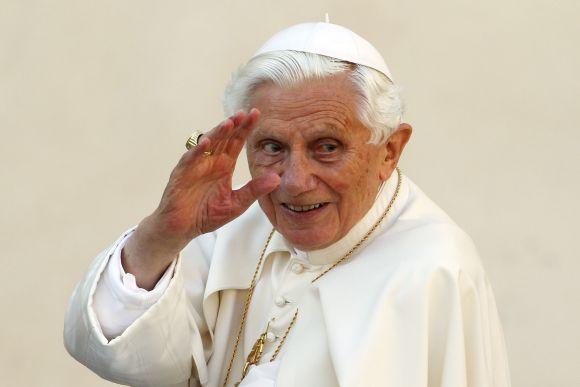
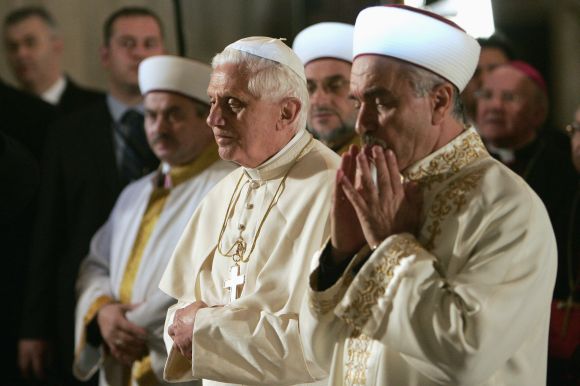
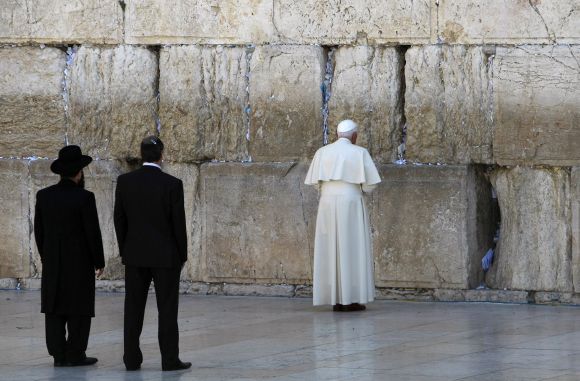
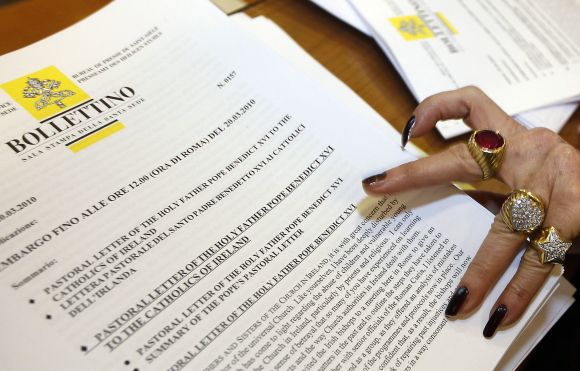
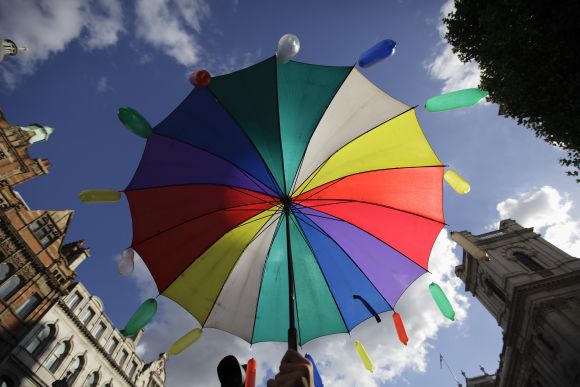
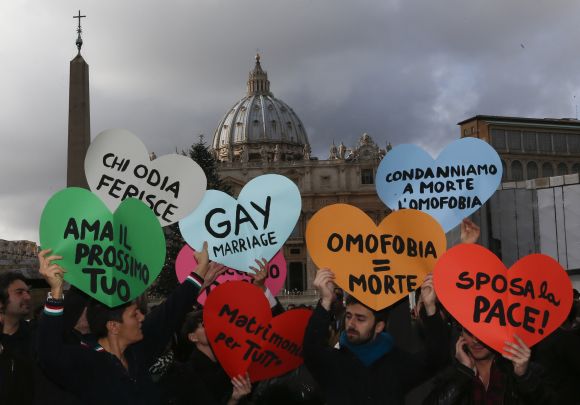
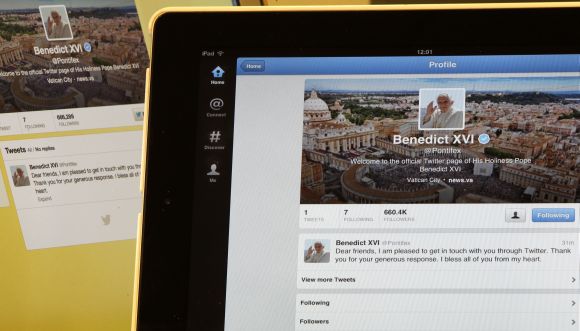
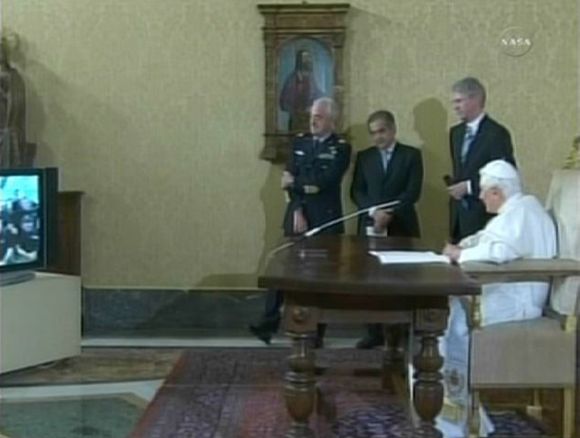
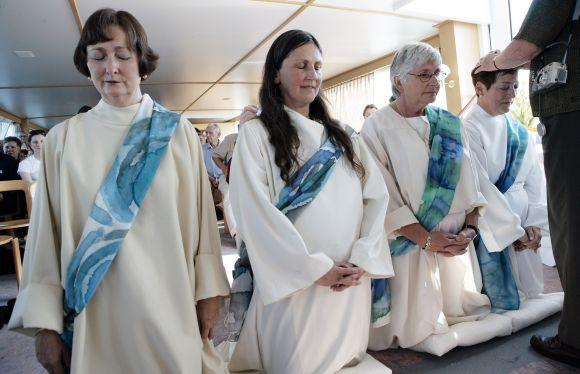
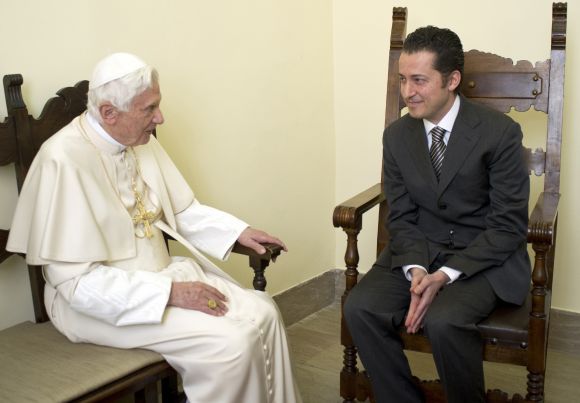
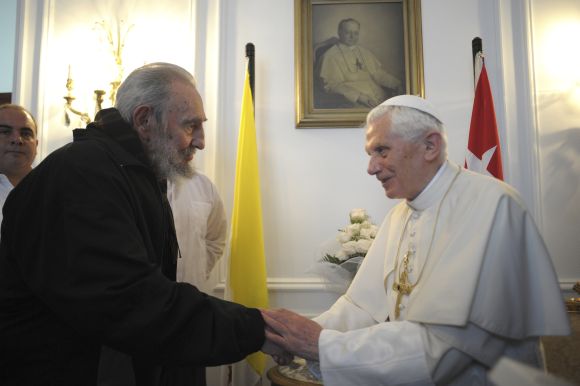
article